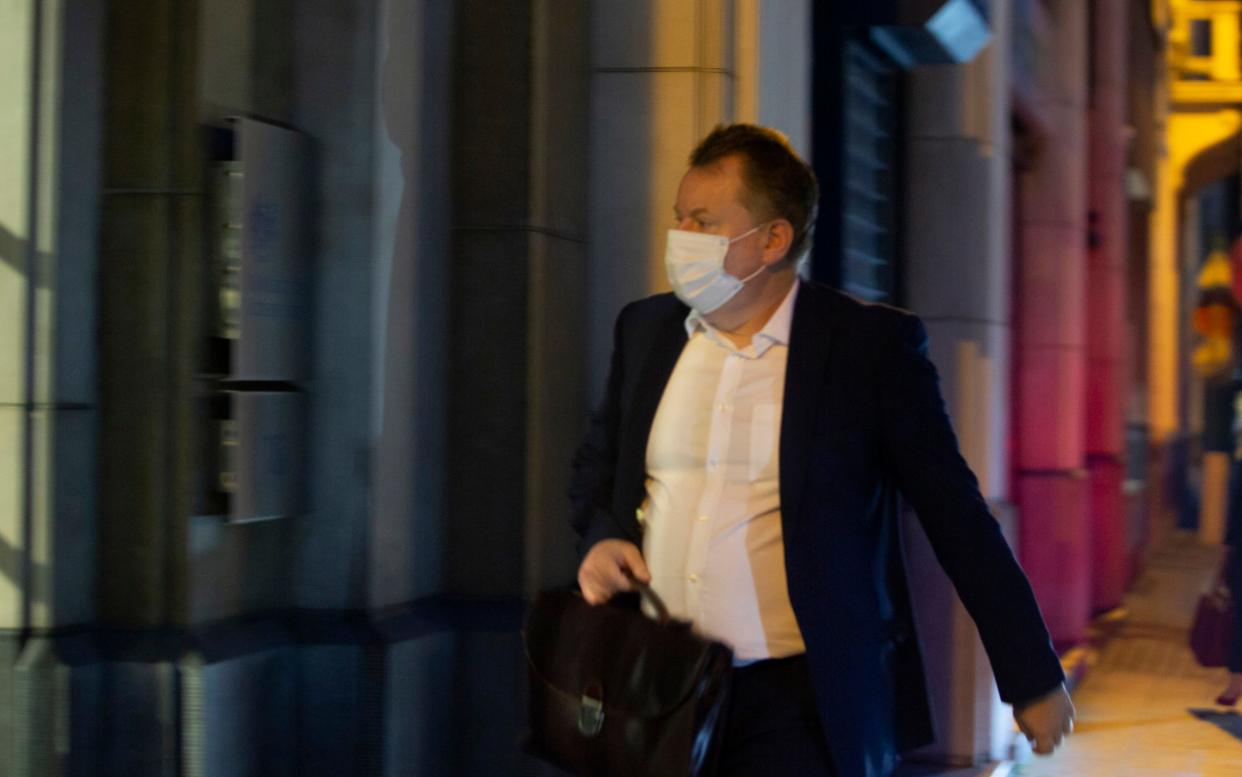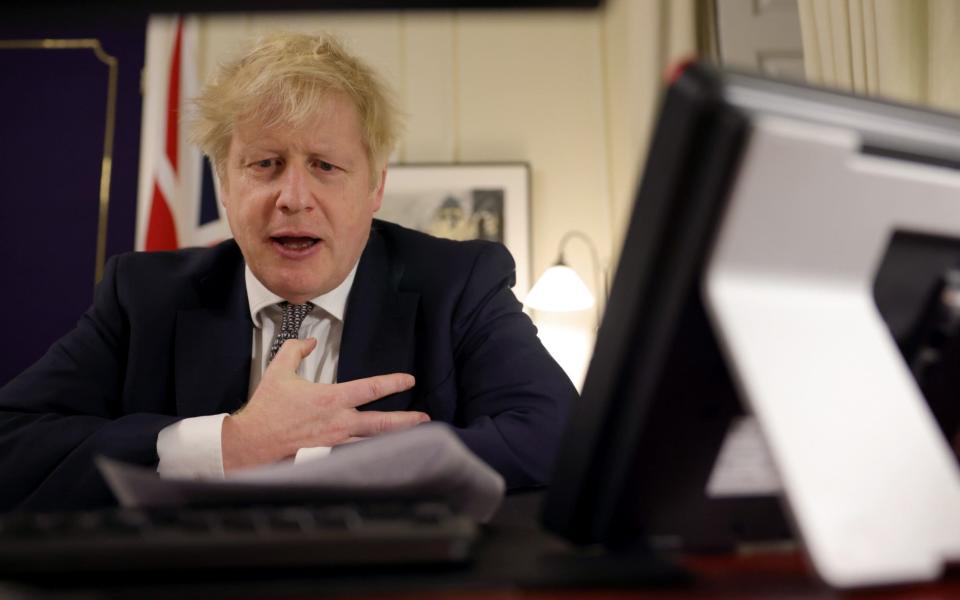Why Brexit deal stalled at the last minute

After almost four years of Brexit negotiations, Michel Barnier’s famous clock was still ticking.
On Wednesday night, expectation was high that the EU and UK would finally strike the trade deal both sides have been waiting for.
All seemed set fair for the white smoke on the agreement to be sent up – but a last-minute hitch stalled progress.
Negotiators were locked in a final push to get the deal over the line, determined not to add another missed deadline to a pile of discarded Brexit deadlines.
The finger of blame in Brussels was pointed in the direction of an anonymous French official who had boasted to a news agency that Boris Johnson had made massive last-minute concessions.
After that was flashed on the wires, progress ground to a halt. “Can’t they just shut up as long as there isn’t a deal? It only provokes a reaction,” an EU diplomat raged.
The chances are that it wasn't entirely the fault of a blabbermouth official. A more likely culprit was a discussion on what the trading rules for electric car parts would be from January 1.
But a deal is still tantalisingly close and real progress towards a final agreement on fishing, the “level playing field” and the deal’s enforcement was made on Wednesday.
Mr Johnson and Ursula von der Leyen, the president of the European Commission, haggled furiously over fishing rights as the two leaders took control of the trade talks, speaking at least five times over the course of the day.
It was only after being told “no” by the EU three times in one week that Boris Johnson started saying “yes” to Brussels.
The road to the deal was paved after Emmanuel Macron, the French president, and Angela Merkel, the German chancellor, rejected the Prime Minister’s pleas for direct talks in early December.
UK-EU trade negotiations had been deadlocked since March over the issues of fishing, the “level playing field” guarantees and the deal’s enforcement.
Mrs von der Leyen informed Mr Johnson that his request for direct intervention to find a breakthrough in the talks was denied for the second time. He was welcome to ask again, she told him over a fish supper on the 13th floor of commission headquarters on Wednesday, but the answer would still be no.
But the December 9 dinner was also the beginning of an understanding between Mr Johnson and the president of the European Commission.
The two, both children of EU officials and alumni of the same European school in Brussels, had a tete-a-tete alone for 45 minutes.
That connection would come into the foreground late in the Brexit endgame with the two in constant phone contact, exchanging offers and counter-offers over fishing quotas.
The next day, as EU leaders met for a summit in Brussels, Mr Johnson gave it one last go. In an interview, he said he was prepared to travel to Paris, Berlin or Brussels to get the deal done.
The timing wasn’t good. The EU needed an opportunity to give a show of strength after divides between the member states over Brexit had finally began to emerge. To make matters worse, the schism was between France and Germany, which holds the rotating presidency of the EU.
Fearful that Michel Barnier might be tempted to give too much away to Britain in the Brexit endgame, Mr Macron had put his foot down. He threatened to veto any trade deal that did not respect French red lines on fishing.
France, and its allies among the fishing nations dependent on access to UK waters, was anxious that Mrs Merkel, who had a horror of no deal, was leaning on Mrs von der Leyen to go soft on Britain if it made concessions on fair competition.
Unfortunately for Mr Johnson, Paris and Berlin had buried the hatchet. The final “no” came in the morning in brutal fashion when EU sources leaked details of the Prime Minister’s humilation to the press.
Later, after British reports branding her “Frau Nein”, Mrs Merkel expressed relief she had nothing to do with the negotiations. That was, thankfully, the commission’s job, she said.
On Sunday, Mr Johnson and Mrs von der Leyen held the latest in a string of crunch calls and decided that talks would go “the extra mile” to give the deal every chance of success.

Brussels had always gambled that, when it came to the crunch, no British Prime Minister would ever go through with no deal. All it had to do was take a negotiating position and hold it until Mr Barnier’s ticking clock did its work for it.
Confident that the EU’s greater size made it far more resilient to the economic impact of WTO terms, it believed that, even if the worst was to happen, a chastened Britain would be forced back to the negotiating table in the New Year. That much was made clear in October, when Mr Johnson theatrically declared the negotiations over and called on Britain to get ready for WTO terms.
David Frost, the UK's chief negotiator, was unimpressed after EU leaders watered down summit conclusions calling for intensified negotiations, which prompted the British walkout.
Even then, Mr Johnson made it clear the door was not closed. The UK was coaxed back into negotiations after Brussels promised daily intensive talks on the basis of legal texts. That concession finally spelled the final end of “parallelism”, an EU strategy of refusing to negotiate on any other subject unless there was progress on the “big three” obstacles to the deal.
The commission was determined not to be bounced into last-minute deals on the three issues and wanted them dealt with first. Britain argued it made sense to get the simpler parts of the agreement nailed down and deal with the difficult stuff last.
In the end the UK got its wish, after a fashion. The “level playing field”, governance and finally fishing were agreed just days before the no-deal deadline.
British sources blame “parallelism” for preventing earlier agreement on a string of trade issues and the refusal to share legal texts earlier for the string of hitches and disagreements over proposals frequently painted as “last-minute demands” by Brussels.
The walkout brought fresh momentum to the negotiations. But the walkback showed Britain would not go through with its threats, even if it had refused to extend the transition period in July as the coronavirus pandemic played havoc with the talks.
After Sunday, Britain began to move. Mr Barnier, for once, was not downbeat and gloomy when he addressed the EU’s ambassadors the next day.
Mr Johnson has calculated that the agreement he has reached is enough for the hardline Brexiteers in his party.
It could still have come late on Wednesday night but, as the hours wore on, it appeared more likely that it would be announced on Thursday.
Once it is, the “dirty text” will be hurried off to the commission lawyers for intensive “legal scrubbing” before it can be approved by EU leaders in time for the end of year no-deal deadline.
These are expected to be formalities – but, as Wednesday showed, Brexit almost always takes longer than it is meant to.

